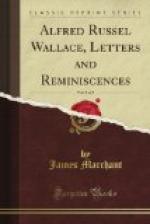“Segregation of the unfit,” he remarked to an interviewer after the Eugenic Conference, at which much was unhappily said that wholly justified his caustic denunciation, “is a mere excuse for establishing a medical tyranny. And we have enough of this kind of tyranny already ... the world does not want the eugenist to set it straight.... Eugenics is simply the meddlesome interference of an arrogant scientific priestcraft.”
Thus his radicalism and his so-called fads were born of his high aspirations. He was not the recluse calmly spinning theories from a bewildering chaos of observations, and building up isolated facts into the unity of a great and illuminating conception in the silence and solitude of his library, unmindful of the great world of sin and sorrow without. He could say with Darwin, “I was born a naturalist”; but we can add that his heart was on fire with love for the toiling masses. He had felt the intense joy of discovering a vast and splendid generalisation, which not only worked a complete revolution in biological science, but has also illuminated the whole field of human knowledge. Yet his greatest ambition was to improve the cruel conditions under which thousands of his fellow-creatures suffered and died, and to make their lives sweeter and happier. His mind was great enough and his heart large enough to encompass all that lies between the visible horizons of human thought and activity, and even in his old age he lived upon the topmost peaks, eagerly looking for the horizon beyond. In the words of the late Mr. Gladstone, he “was inspired with the belief that life was a great and noble calling; not a mean and grovelling thing that we are to shuffle through as we can, but an elevated and lofty destiny.”




